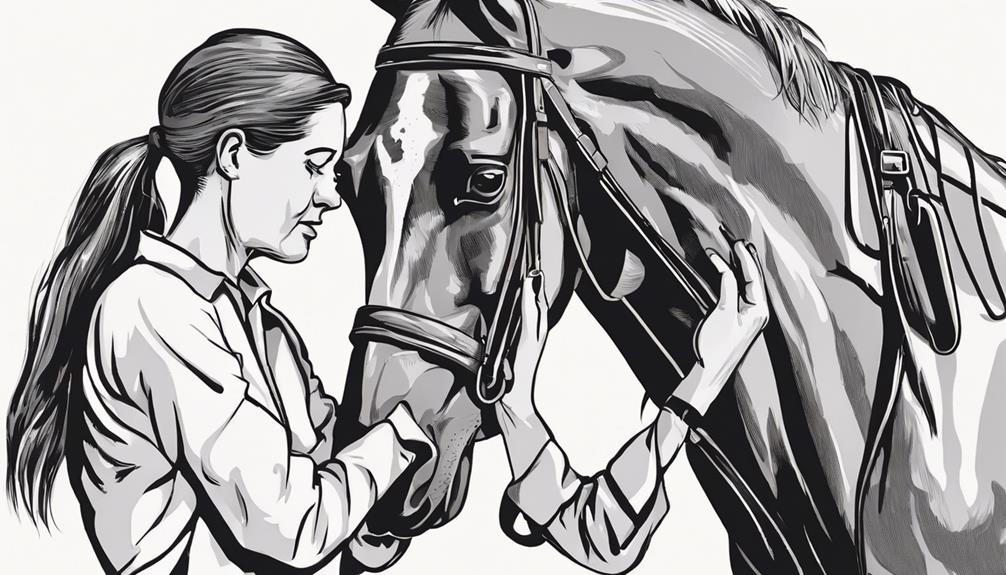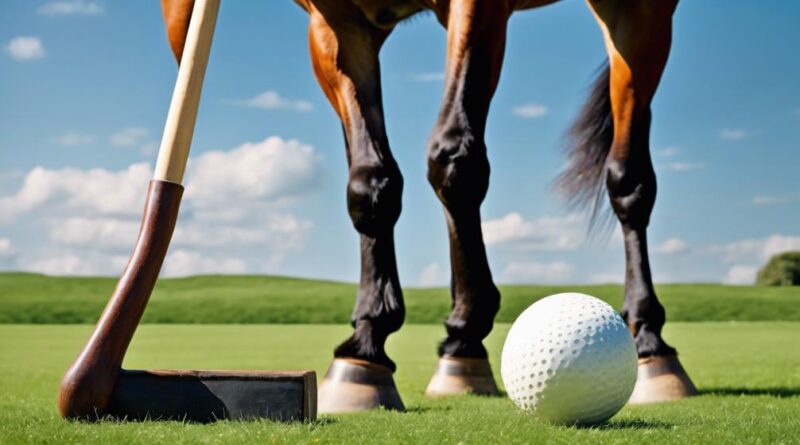Guide to Polo and Horseball Horse Healthcare
When it comes to taking care of your polo and horseball horses, think of them as finely tuned instruments that require constant maintenance to perform at their best.
From preventing common injuries to ensuring proper nutrition and exercise, the well-being of your equine athletes is crucial for their performance.
As you navigate the realm of horse healthcare in these competitive sports, understanding the nuances of preventive measures and seasonal considerations can make a significant difference in your horse's overall health and longevity.
Stay tuned for expert insights on how to optimize your horse's well-being for peak performance.
Common Injuries in Polo Horses
When playing polo, horses can sustain various injuries due to the fast-paced nature of the sport and the physical demands placed on them. Two common injuries that polo horses may experience are tendon strains and muscle soreness.
Tendon strains occur when the tendons, which connect muscles to bones, become overstretched or torn due to the quick stops, starts, and turns involved in polo. It's essential to monitor your horse for any signs of lameness, swelling, or heat in the affected area, as these could be indicators of a tendon strain.
Muscle soreness is another frequent issue among polo horses, especially after intense training sessions or matches. The rapid acceleration and deceleration required in polo can put a strain on the horse's muscles, leading to soreness and stiffness. To help alleviate muscle soreness, proper warm-up and cool-down routines are crucial. Additionally, incorporating regular massages and stretching exercises into your horse's routine can aid in preventing and managing muscle soreness.
Nutrition and Feeding Guidelines
To ensure optimal performance and health for your polo horse, it's essential to establish proper nutrition and feeding guidelines. Weight management plays a crucial role in maintaining your horse's overall well-being. Ensure a balanced diet that meets your horse's energy requirements without causing excess weight gain. Consult with a veterinarian or equine nutritionist to create a customized feeding plan tailored to your horse's individual needs.
Incorporating dietary supplements may be necessary to address specific nutritional deficiencies or support your horse's performance. However, it's important to use supplements judiciously and under professional guidance to prevent over-supplementation, which can have adverse effects on your horse's health.
Digestive health is paramount for your polo horse's overall condition. Provide a consistent and high-quality forage source, such as hay, to support proper digestion. Additionally, ensure access to fresh water at all times to meet your horse's hydration needs. Proper hydration is essential for optimal performance and can help prevent issues such as colic.
Importance of Regular Exercise
Regular exercise is essential for maintaining the physical fitness and performance of your polo horse. It plays a crucial role in ensuring that your horse is in top condition to meet the demands of polo or horseball. Here are some key points to consider:
- Conditioning Routines: Implementing structured conditioning routines tailored to your horse's needs can help improve strength, stamina, and overall performance. These routines can include a mix of cardiovascular exercises, interval training, and strength-building exercises to target different muscle groups.
- Benefits of Regular Exercise: Engaging your horse in regular exercise not only helps improve physical fitness but also mental well-being. It can prevent boredom, reduce stress, and enhance the bond between you and your horse. Additionally, consistent exercise can contribute to better coordination, agility, and overall athleticism.
- Fitness Assessments: Regular fitness assessments are essential to track your horse's progress and make necessary adjustments to the exercise routine. These assessments can help identify areas that need improvement and ensure that your horse is reaching optimal fitness levels for peak performance.
- Progress Tracking: Monitoring your horse's progress over time allows you to gauge improvements and make informed decisions regarding training adjustments. Keeping track of milestones achieved during exercise can motivate both you and your horse to continue working towards your goals.
Preventive Healthcare Measures
Implementing preventive healthcare measures is crucial to ensuring the long-term well-being and performance of your polo or horseball horse. Proper dental care is essential to maintain your horse's overall health. Regular dental check-ups and floating (filing down sharp edges) of teeth are necessary to prevent issues like discomfort while eating or difficulty in carrying the bit during play. Neglecting dental care can lead to more serious problems such as weight loss and performance issues.
Additionally, following a vaccination schedule is vital in protecting your horse from various diseases. Consult with your veterinarian to create a customized vaccination plan based on your horse's age, health status, and the specific risks in your region. Vaccinations help boost your horse's immune system and prevent the spread of contagious diseases within the equine community.
Proper Hoof Care Practices
Proper hoof care practices are essential for maintaining the health and performance of your polo or horseball horse. To ensure your horse's hooves are in top condition, consider the following:
- Hoof Trimming: Regular hoof trimming is crucial to prevent issues like overgrowth, cracks, and imbalances. Schedule routine trims with a professional farrier to keep your horse's hooves healthy and properly shaped.
- Shoeing Techniques: Depending on your horse's needs and the type of activities it engages in, shoeing can help provide additional support and protection. Work closely with your farrier to determine the best shoeing techniques for your horse.
- Diet: A balanced diet plays a significant role in hoof health. Ensure your horse receives the necessary nutrients like biotin, zinc, and copper, which are essential for strong hooves. Consult with a veterinarian to create a diet plan tailored to your horse's hoof care needs.
- Supplements: In some cases, supplements can be beneficial for maintaining healthy hooves. Consider adding supplements like biotin or omega-3 fatty acids to support hoof growth and strength. However, always consult with your vet before introducing any new supplements to your horse's diet.
Mental Health and Well-being
Ensuring your horse's mental health and well-being is just as crucial as maintaining its physical condition for optimal performance in polo or horseball. One way to support your horse's mental well-being is through stress management techniques. Horses, like humans, can experience stress from various sources such as training, competition, or changes in their environment. To help your horse cope with stress, provide a consistent routine, a comfortable living environment, and ample turnout time. Additionally, incorporating regular grooming sessions, relaxing massages, and positive reinforcement during training can all contribute to reducing your horse's stress levels.
Equine therapy is another valuable tool for promoting your horse's mental health and overall well-being. This form of therapy involves activities such as groundwork exercises, interactive games, and trail rides that aim to strengthen the bond between you and your horse while providing mental stimulation and enrichment. By engaging in equine therapy sessions, you can help your horse build confidence, trust, and relaxation, which can have a positive impact on their performance in polo or horseball.
Managing Stress and Anxiety

To effectively manage stress and anxiety in your polo or horseball horse, prioritize establishing a calming and consistent routine. This routine should include regular exercise, proper nutrition, and mental stimulation to help your horse feel secure and at ease.
In addition to a routine, here are some key relaxation techniques and stress management tips to consider:
- Massage Therapy: Implementing regular massage sessions can help relax your horse's muscles and release tension, promoting overall well-being and reducing stress.
- Groundwork Exercises: Engage your horse in groundwork exercises to build trust and communication, which can alleviate anxiety and create a stronger bond between you and your horse.
- Quiet Time: Allow your horse time to relax and unwind in a quiet environment, free from distractions. This downtime is essential for reducing stress levels and promoting a sense of calm.
- Grooming Sessions: Regular grooming not only keeps your horse clean but also provides a soothing and bonding experience. Use grooming sessions as an opportunity to connect with your horse and help them feel relaxed.
Incorporating these relaxation techniques and stress management strategies into your horse's routine can significantly improve their mental well-being and overall performance in polo or horseball. Remember, a happy and relaxed horse is more likely to excel in their athletic endeavors.
Seasonal Health Considerations
Considering your polo or horseball horse's well-being throughout the year, it's essential to address seasonal health considerations to maintain their optimal performance and overall health. When it comes to parasite control and vaccination schedules, staying up to date is crucial. Regular deworming helps prevent parasitic infestations that can affect your horse's health and performance. Consult with your veterinarian to establish a deworming schedule tailored to your horse's specific needs. Additionally, ensure your horse is current on all necessary vaccinations to protect against common diseases.
Allergies and skin conditions can also impact your horse's well-being, especially during certain seasons. Keep an eye out for signs of allergies like itching, hives, or respiratory issues. If your horse is prone to allergies, discuss preventative measures and treatment options with your vet. Regular grooming and cleaning can help prevent skin conditions and keep your horse comfortable. Consider using fly sheets or masks during peak fly seasons to minimize irritation.
Frequently Asked Questions
Can Polo and Horseball Horses Participate in Other Equestrian Sports as Well?
Yes, polo and horseball horses can participate in other equestrian sports too. Cross training benefits both you and your horse by improving overall fitness and skills.
These versatile horses are suitable for various disciplines like show jumping, dressage, and eventing. By engaging in different activities, you can keep your horse mentally stimulated and physically balanced, leading to a well-rounded athlete ready to excel in any sport you choose.
Are There Any Specific Grooming Tips for Maintaining the Health and Appearance of Polo and Horseball Horses?
To keep your polo or horseball horse healthy and looking good, focus on proper nutrition and regular hoof care. Make sure they have a balanced diet and good quality hay.
Trim their hooves regularly to prevent issues. Brush their coat and mane often to keep them clean and shiny.
These simple grooming tips will help maintain your horse's health and appearance for all their equestrian endeavors.
How Often Should Polo and Horseball Horses Receive Dental Care?
To keep your polo and horseball horses healthy, make sure they get dental care at least once a year. Equine nutrition plays a big role in their dental health.
Don't forget about hoof maintenance and a good exercise routine too. By staying on top of these areas, your horses will be in top shape to perform their best on the field.
What Are Some Common Behavioral Issues Seen in Polo and Horseball Horses, and How Can They Be Addressed?
When dealing with behavioral issues in polo and horseball horses, it's essential to understand common problems like anxiety or aggression. Using positive reinforcement training methods and behavior modification techniques can help address these issues effectively.
Incorporating regular exercise routines and providing mental stimulation through varied activities can also contribute to improving the overall behavior of your horse.
Are There Any Specific Regulations or Guidelines for Transporting Polo and Horseball Horses to Competitions or Events?
When transporting your polo or horseball horses to competitions or events, it's crucial to follow transport regulations to ensure their safety. Proper preparation is key to managing stress during transportation.
Make sure your horses are comfortable and secure in the trailer, check on them regularly, and provide necessary breaks for rest and hydration. By prioritizing their well-being and adhering to guidelines, you can help your horses arrive at the competition in the best possible condition.
Conclusion
Overall, taking care of your polo or horseball horse's health is crucial for their performance and well-being. By being proactive with their healthcare, providing proper nutrition, exercise, and preventive measures, you can ensure they stay in top condition.
Don't forget the importance of mental health and managing stress, along with seasonal health considerations. By following these guidelines, you can help your horse stay healthy and happy for years to come.
